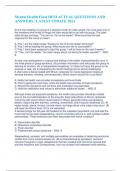Exam (elaborations)
Mental Health Final HESI ACTUAL QUESTIONS AND ANSWERS | LATEST UPDATE 2023
- Course
- Institution
Mental Health Final HESI ACTUAL QUESTIONS AND ANSWERS | LATEST UPDATE 2023 At the first meeting of a group at a daycare center for older adults, the nurse asks one of the members what kinds of things the client would like to do with the group. The older adult shrugs and says, "You tell me. You'r...
[Show more]



